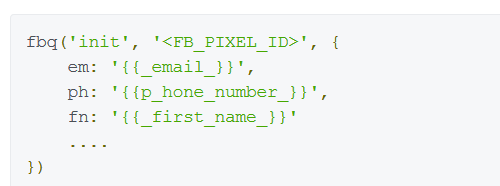Every brand leveraging Facebook ads is making full use of its pixel (or at least it should).
It allows you to segment traffic based on their position in your sales funnel, actions taken on your website and you can even create new audiences from it.
Without using the Facebook pixel, most businesses wouldn’t be able to run scalable Facebook campaigns, after all retargeting helps lower CPM, increase CTR and lead generation:

(Source)
Facebook knows the power of its pixel and recently added Advanced Matching options allowing advertisers to capture more information of its website visitors.
Before Advanced Matching, you could only obtain the following data from a website visitor:
- Phone number
- Mobile advertiser ID
- Facebook app user ID
New Advanced Matching includes:
- First name
- Last name
- Zip code
- City
- State
- Country
- Date of birth
- Year of birth
- Age
- Gender
Facebook states:
“Implementing this feature, advertisers can report on more conversions, optimize their ads against more conversion data, and reach more people on Facebook with their website custom audiences or dynamic ads.” – Facebook.
How Does Advanced Matching Work?
Before I talk about how the new Advanced Matching feature works, let me walk you through the current Facebook pixel and its problems.
One of the biggest drawbacks of the current Facebook pixel is that it’s sometimes unable to tell whether user made a certain action or not. For example, if someone visits your website but is not logged into Facebook, you’re unable to track and segment them accordingly, this is also true if they visit on another device, use private browser features or delete their cookies.
In these cases, the Facebook pixel is unable to verify who is viewing your content and may incorrectly place users in the wrong custom audience. This leads to them being shown the wrong messages, getting frustrated and increase your ad costs.
While Advanced Matching doesn’t completely solve the issue of assorting users who bypass the cookie feature, its new matching metrics does improve the segmentation and filtering process.
Using all the filters in the new Advanced Matching, Facebook’s algorithm can use the datasets you’ve applied to make the best identification possible for the user and place them in the correct custom audience.
What’s more, if you have thousands of telephone numbers or zip codes, you can now upload them to Facebook and base audiences around them. Before this, the most effective way was to create new audiences was using email addresses, now you can create them based on their location and even date of birth.
This becomes extremely useful when you’re targeting audiences from different states, as consumers on the West Coast will have different interests and behaviors than those on the East Coast:

(Source)
How To Setup Advanced Matching
To install Advanced Matching you need to add a few extra lines of code to your current pixel code.
You will need to remove this line of code:
And replace it with this:
Where you see the expressions for email, first name and phone number, Facebook will automatically pull the details if they are able to.
If your website isn’t using JavaScript, you can still use the img tag but you have to hash the customer data manually. You can learn how to do this by following the steps listed on the Facebook Developers blog.
Does Advanced Matching Help Increase ROI?
According to Facebook, Advanced Matching has helped businesses increase attributed conversions by 10% and increased campaign reach by 20% through retargeting.
Facebook believes businesses who take advantage of Advanced Matching will:
“Find more conversions, improve optimization and remarket to more people. By doing so, you will be able to significantly increase the ROI of your Facebook campaigns.” –Facebook.
But What About Data Privacy?
All data passed through Advanced Matching is hashed locally on the user’s web browser before it’s sent to Facebook. Facebook states that this data cannot be tampered with and uses the data to match users up on Facebook to place in the correct audiences only.
All matched and unmatched hashes are deleted directly after processing and are not stored on servers or used to collect personal information. All data is sent using secure HTTPS.
Summary
Advanced Matching is the next step with Facebook ads to further personalize the brand marketing experience users have with your business. It won’t be long before you can start using the data from Advanced Matching to place the user’s name, location and age to better tailor ad copies for conversions.
How will you be using Advanced Matching?